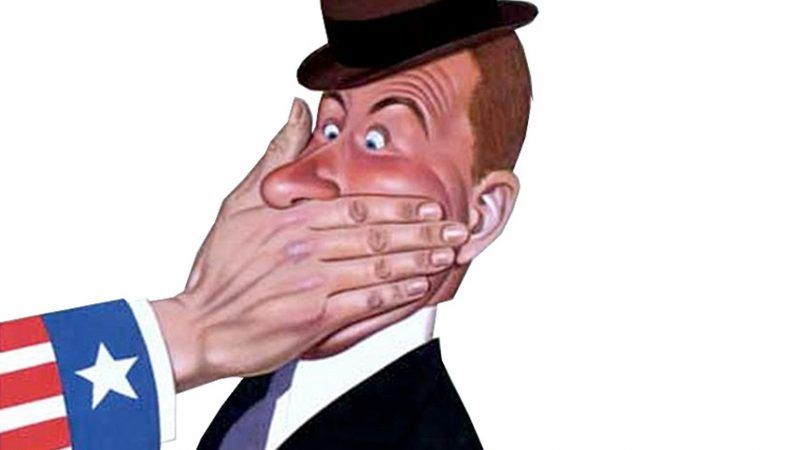When the Government Declared War on the First Amendment
It all started with President Woodrow Wilson.

One hundred years ago, the U.S. government declared war on the First Amendment.
It all started with President Woodrow Wilson. On April 2, 1917, Wilson urged the nation into battle against Germany in order to "make the world safe for democracy." But the president also set his sights on certain enemies located much closer to home. "Millions of men and women of German birth and native sympathy…live among us," Wilson observed. "If there should be disloyalty, it will be dealt with with a firm hand of repression."
That firm hand came in the form of the Espionage Act, which Congress passed in June 1917 and Wilson eagerly signed into law. Among other things, the act made it illegal to "convey information with intent to interfere with the operation or success of the armed forces of the United States or to promote the success of its enemies." That sweeping language effectively criminalized most forms of anti-war speech. If convicted of obstructing the war effort, the guilty party faced up to $10,000 in fines and up to 20 years in prison.
With that law in place, Wilson's threats of repression soon became reality. In August, the federal government arrested and imprisoned Charles Schenck, the general secretary of the Socialist Party. His crime? Printing and distributing thousands of anti-war leaflets. Schenck maintained that the First Amendment clearly protected his right to speak out in that manner against U.S. militarism, but his arguments fell on deaf ears.
On March 3, 1919, the U.S. Supreme Court upheld his conviction. "When a nation is at war," declared Justice Oliver Wendell Holmes Jr. in Schenck v. United States, "many things that might be said in time of peace are such a hindrance to its effort that their utterance will not be endured so long as men fight." He waved away the First Amendment consideration. "The most stringent protection of free speech would not protect a man in falsely shouting fire in a theatre and causing a panic," he wrote. Censors have been quoting that sentence ever since.
One week later, Holmes dismissed the First Amendment yet again, this time upholding an Espionage Act conviction of the union leader and perennial Socialist Party presidential candidate Eugene Debs, who had been arrested in 1917 after giving a mildly anti-war speech at an afternoon picnic. "This man is the palpitating pulse of the sedition crusade," federal prosecutor F.B. Kavanaugh had declared during the trial.
"One purpose of [Debs'] speech, whether incidental or not does not matter, was to oppose not only war in general but this war," Holmes wrote in Debs v. United States, "and that the opposition was so expressed that its natural and intended effect would be to obstruct recruiting."
So much for "Congress shall make no law…abridging the freedom of speech." Debs would languish in prison until 1921, when he was finally pardoned by President Warren G. Harding.
These old cases have important lessons to teach us today. For starters, they demonstrate why the exercise of fundamental rights should never be subject to majority approval. The Espionage Act was passed by a democratically elected legislature and enforced by a democratically elected president, and it was probably in tune with the will of most Americans at that time. But of course, the whole point of the First Amendment is to place certain rights beyond the reach of the majority.
These cases also demonstrate the importance of an independent judiciary that is prepared to check the other branches of government when they go too far. It is no coincidence that Holmes was the justice who led the Court in trashing the First Amendment in Schenck and Debs. Far too often throughout his long career on the bench, he advocated judicial deference to majoritarian government.
"A law should be called good," Holmes once wrote, "if it reflects the will of the dominant forces of the community, even if it will take us to hell." That sort of judicial pacifism should have no place on the Supreme Court.
This article originally appeared in print under the headline "When the Government Declared War on the First Amendment."


Show Comments (77)